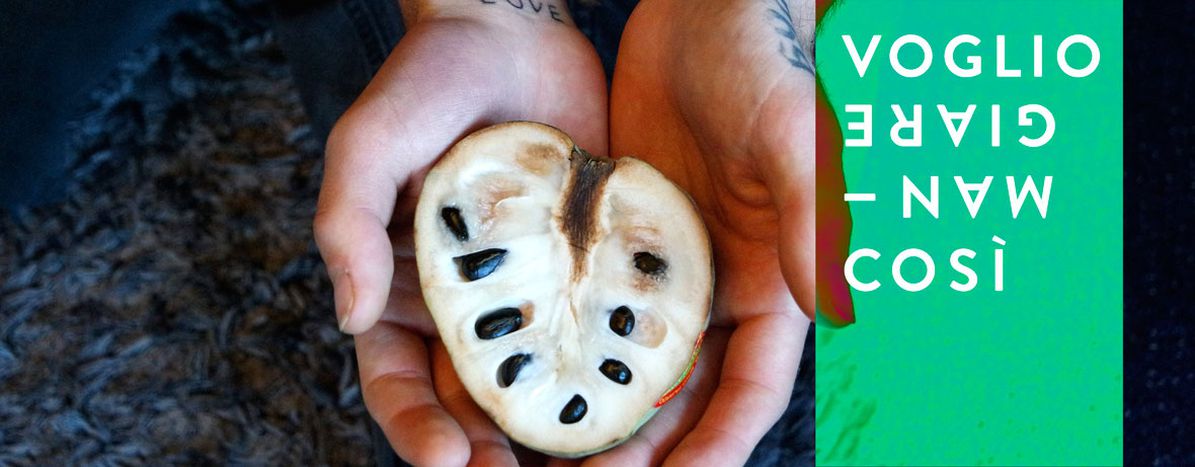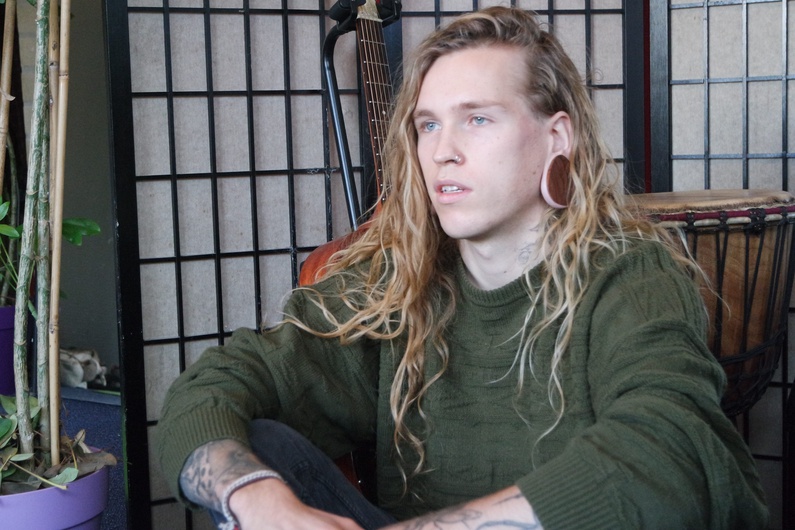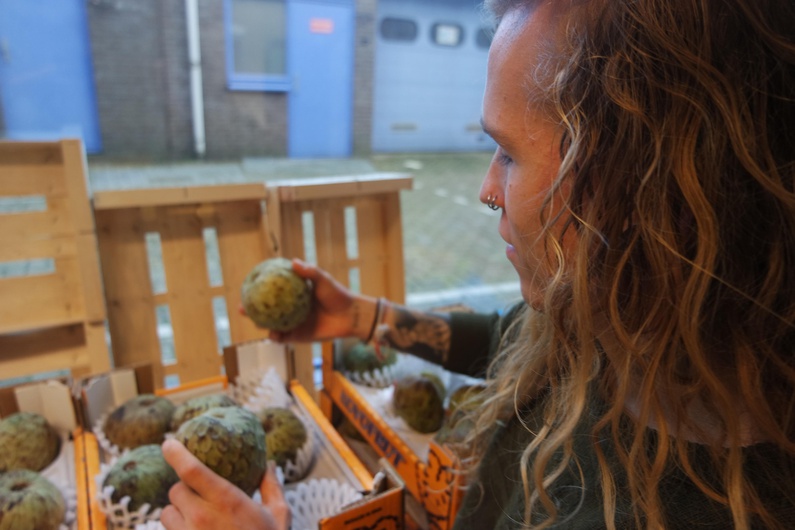
From meat-eating fitness freak to fruitarian
Published on
For Mees Vullings, there is no such thing as a forbidden fruit. In fact, fruit is the very core of his diet. But how did this young Dutchman go from meat-eating bodybuilder to fruitarian in just three years? Like most great stories, it all began with a cat.
When he adopted a stray cat, Mees Vullings’ life changed forever. That was a little over one year ago, a time in which the 23-year-old was living with his vegan girlfriend. One day, as he looked down at his small, four-footed companion in his apartment in Tilburg, he realised that nothing made sense. “Why should I give this animal all my love and respect, and then ask other people to kill animals for me?” Mees immediately went from carnivore to vegan overnight, a choice that eventually led him to his current diet: fruitarianism.
Labels, fruitarians and Steve Jobs
Today, Mees lives in Leiderdorp, a small town in the western Netherlands with about 27,126 inhabitants. The town is nestled close to Den Haag, where Mees studies art therapy. The building Mees lives in is occupied by young people who share his eating habits, or, at the very least, a similar mindset. He speaks slowly and in a low voice, as if to weigh each word carefully before letting it out. His body is decorated with tattoos and he has long, flowing blond hair that curls the closer it gets to his ears. There is no use in trying to pin Mees down and label him as one thing. He is a musician, an art therapist, he loves yoga and tattoos, is somewhat of a raw food guru on Instagram and a fruitarian at all once. In fact, Mees doesn’t believe in labels: “I moved away from labels because I find that labels make us behave in a certain way… I just want to be as free as possible.” But for the sake of simplicity, let’s just say that Mees is a fruitarian.
 The fruitarian diet is a branch of veganism, a diet that excludes all animal products. Raw vegans are vegans who only eat raw plant-based products (not cooked over 48°C), so fruitarians are essentially raw vegans who eat, well, fruit. The revelation that Mees had after adopting his cat goes hand in hand with a larger belief system linked to these diets: that humans are not superior to animals or nature.
The fruitarian diet is a branch of veganism, a diet that excludes all animal products. Raw vegans are vegans who only eat raw plant-based products (not cooked over 48°C), so fruitarians are essentially raw vegans who eat, well, fruit. The revelation that Mees had after adopting his cat goes hand in hand with a larger belief system linked to these diets: that humans are not superior to animals or nature.
When typing the word ‘fruitarian’ in Google images, you will find an array of beautiful people posing next to mountains of colourful fruit. Their hair is shiny, their skin is clear as water and they are perfectly sun-kissed, exposing toned muscles. Like Mees, they tend towards a holistic lifestyle where yoga and meditation are fundamental for “spiritual growth”.
What you’ll also find in Google images are rare glimpses of Ashton Kutcher and Steve Jobs. Steve Jobs was known to follow a fruit-based diet, so when Kutcher was chosen to play Jobs in a 2013 biopic, Kutcher naturally followed suit. Only a few days before shooting the film, Kutcher was rushed to the hospital with pancreas problems. Whether or not this is proof that the fruitarian diet is too restrictive doesn’t faze Mees, though. Unlike his decision to become a vegan, his journey to fruitarianism was a gradual process, not something that happened overnight.
Carnivorous body-builder to vegan overnight
Mees grew up in a family that did not particularly put a lot of weight on what they ate. “No one is vegetarian in my family. [When I was younger] they told me to eat my vegetables and stuff, like most parents. But nothing specific,” Mees explains. Three years ago, Mees was into bodybuilding and fitness. He ate meat and dairy products daily without questioning whether or not it was bad for his health, simply because he felt good. “I was, like, the biggest meat-eater ever,” he admits, but that was before Mees adopted his famous stray cat.
When Mees told his parents that he had decided to go vegan, they didn’t believe him: “They thought I would go back to eating meat.” That was only the initial shock. Three months later, when he told his family he had changed his diet to mostly fruit, they thought he was completely crazy. As for his friends and acquaintances, they had similar reactions. People would constantly tell Mees that he had changed, that he was no longer the same person they had known for years. The young Dutchman disagrees: “I didn’t change as a person. I just started focusing on different things.”
Thinking back to the time where he was into bodybuilding, Mees admits he felt like somewhat of a zombie. His transition from meat-eating fitness geek to vegan to fruitarian happened gradually. It all started to make sense when Mees realised that, the more fruit he ate, the more energy he had. At the beginning, he often he felt like he was “on ecstasy the whole time.” But it was never Mees’ intention to become a fruitarian; it was almost like an accident waiting to happen, in the best way possible. “Eventually I was eating mostly fruit, I started feeling better.” While his transition to veganism was sparked by ethical reasons (the cat), his choice to switch to a fruit-based diet was mostly for “health reasons” and because “fruit tastes good.”
Fruit philosophy and Dr. Morse
Mees is convinced that fruit is what humans should be eating. His personal transition to becoming a fruitarian has been so beneficial to him that he wants to inspire others to join the movement. Not only does the 23-year-old “want people to be more conscious about their choices… more loving and kind in general,” but he also thinks “fruit is our species-specific diet.” According to Mees, humans are perfectly built to pick, eat and digest fruit. He finds it strange and “weird” that humans cook their food, seeing as every other animal on Earth eats their food raw. The young student also thinks that we should be eating one food item at a time “without spices and stuff”, seeing as most animals do the same. Ergo: fruit is the optimal food source for humans.
Mees hasn’t built this meticulous dietary theory on his own, though. After having gone on a bit of a rant about what humans should and shouldn’t eat, he mentions an enigmatic Dr. Morse, whose work he has been following for some time. Mees explains that Dr. Morse is an American man, more or less in his sixties, who owns a health club as well as a YouTube channel with about 57,700 followers. Mr. Morse has been healing people from life-threatening diseases such as cancer using fruit and herbs for 45 years. “[Dr. Morse] puts people on a fruit-only diet and some herbs to support the organs, and they heal from every disease. It’s not like the fruit is healing them, but the fruit makes it possible for the body to heal itself,” the fruitarian clarifies. He continues: “That is why medicine doesn’t work… it can only suppress symptoms, but it can’t heal anything.” Dr. Morse wasn’t the reason Mees converted to fruitarianism a year and a half ago, but he admits that his work makes him “certain that what I am doing is the right thing.”
If all of this sounds a bit dubious, it’s because it is. Dr. Morse offers all of the knowledge and experience he gathers from his health club in free YouTube videos. In the videos, the health guru sits at his desk in a comfortable armchair, papers scattered in front of him as if the camera had accidentally caught him doing research. He has a thick, chevron moustache with a good head of grey hair. Behind him, a large and abstract painting of a heart decorates the wall, along with a collection of Native American paraphernalia. Lasting up to an hour long, the videos tackle anything from “brain issues and Parkinson’s disease” to “Ayahuasca and Lyme disease”. For his part, Mees is utterly convinced. “I think that is just amazing. A lot of these health gurus charge a lot of money, but he doesn’t do it.” Like Dr. Morse, Mees strives towards becoming an “open-minded, spiritual and free human being.”
“There are times where I only eat watermelon for 18 days”
Wintertime in the Netherlands can be menacing. Months go by without a ray of sunlight, and the humid air means the cold can seep through your clothes and get into your bones. Mees’ diet is what keeps him energised. He buys his fruit at Turkish supermarkets, which offer a larger selection of exotic fruit and are often cheaper than regular supermarkets. In these cold winter months, the 23-year-old binges on cherimoyas. They are about the same size as a small cantaloupe and have green, scaly skin. To eat them, the specialist explains, you have to cut them in half or peel them to scoop out a white pulp that tastes a lot like frozen yogurt.
 On a typical winter day, Mees eats about four or five cherimoyas per meal. He eats his first meal just before 12 pm and usually skips breakfast. Contrary to what Google images shows us when searching ‘fruitarian’, there is not a mountain of fruit to choose from in the Netherlands. That’s why, during colder seasons, Mees compliments his fruit-based diet with raw salads. He also drinks copious amounts of tea (up to two litres a day) to quench his thirst and stay warm.
On a typical winter day, Mees eats about four or five cherimoyas per meal. He eats his first meal just before 12 pm and usually skips breakfast. Contrary to what Google images shows us when searching ‘fruitarian’, there is not a mountain of fruit to choose from in the Netherlands. That’s why, during colder seasons, Mees compliments his fruit-based diet with raw salads. He also drinks copious amounts of tea (up to two litres a day) to quench his thirst and stay warm.
In the summertime, Mees simply changes the contents of his minimalistic diet and adapts it to what is available. As the weather gets warmer, the choice of fruit in his neighbourhood supermarkets becomes richer. Mees’ diet changes from cherimoyas and bananas to peaches and watermelons, and he barely drinks any water at all. “There are times where I only eat watermelon for 18 days and I don’t even think about drinking water,” he confesses, without flinching.
When asked about the environmental impact of eating imported produce, Mees still doesn’t flinch. “I eat fruit mainly from Spain, so the [carbon footprint from transportation] is not that bad. I could eat local and it would be better, but I don’t feel my best on local food. All they grow here are apples, pears and berries. Those don’t make me feel as good,” he says confidently. Mees is conscious of the environmental impact of a fruitarian diet. Still, he doesn’t pretend to be a moral saint, and prefers a diet that makes him feel good. He believes that positivity will be more productive than him eating local produce: “When I am feeling my best, I can radiate way more positivity in this world. This can have a huge effect on way more people. I feel better, and that makes other people feel better.” With 19,500 followers on Instagram, he may just have a point.
To Instagram and beyond
Mees uses his Instagram account to spread his philosophy and lifestyle. Littered with endless photos of colourful fruit platters, fresh juices and raw vegan meals, he could trick anyone into believing he lives on a tropical island. Under each photo, Mees adds a caption explaining what’s on display, often going into detail about the taste and texture of his meals. Although he has a strong community of followers, he explains that it was never his intention: “I just started because I felt like it, and suddenly it started to take off. People started to like whatever I was writing, because I was not only posting fruit things. I was writing things that I wanted to get off my chest; things people could use to better themselves. It’s about spiritual growth, self-development and yoga and whatever. People find that nice to read I guess.”
Although he’s touched thousands of people from all over the world with his Instagram account, Mees isn’t going anywhere just yet. With his art therapy studies underway, his stray cat and his cosy Leidendorp apartment, the 23-year-old will have to brave the Dutch climate for a little longer. But that doesn’t stop him from dreaming. “If we just planted food trees all around the world, everyone would have free fruit. Why don’t we do that? If that were the case, I wouldn’t live in the Netherlands. I would move to wherever and build my house or sleep under a tree; it doesn’t really matter. As long as the fruit is for free,” he says, smiling at the thought. Who knows, maybe in a few years we will find him sipping a fresh coconut in the Caribbean, under a palm tree with his smartphone in hand, posting pictures of the ultimate fruitarian dream



